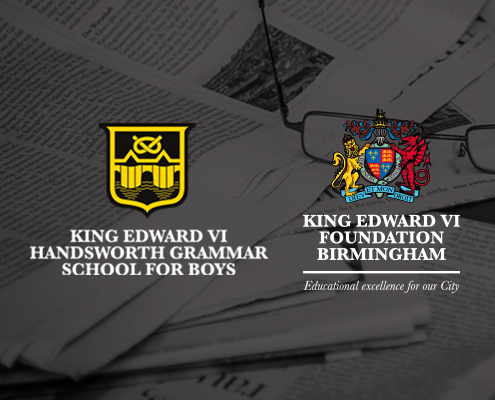Ex HGS Student Holds Art Exhibition
Amaan Jahangir is holding an Art Exhibition between the 15th an 21st December between 12pm and 5pm.
Please click here to see more information about Amaan.
Draws Galore!
In recent League fixtures the Year 7 Football team drew 5-5 with Hamstead Hall and the Year 8 team drew 4-4 with George Dixon. Both our teams remain top of the Leagues though!
Congratulations.
Strategic Planning
Please click on the links below to view our updated SDP and SEF.
Focus on Education
Last week the National Literacy Trust published a report on mental wellbeing, reading and writing. The trust surveyed nearly fifty thousand school-age children in the UK and found that children who are the most engaged with reading and writing (i.e. those who enjoy it, do it daily and have positive attitudes towards it) are three times more likely to have higher levels of mental wellbeing than children who don’t. The report is well worth a read and the website also has a link to top tips and reading lists for parents. Please click here for more details.
Successful start to the new season
In their first game for King Edward VI Handsworth Grammar School for Boys, the Year 7 Football Team put on a show in a 6-1 victory against Great Barr Academy. All of the boys were a credit in representing the school. We hope they continue this positive start in the remainder of their games this season.
Goal scorers:
Daniel Chikwizo (7A) – Hat-trick
Haadi Sarwar (7H) – 1
Danyaal Zabir (7A) – 1
Oliver Martin Panther (7N) – 1
Man of the Match – Daniel Chikwizo
Macmillan Coffee Morning
On Tuesday 25th September the Design and Technology Department hosted a Macmillan Coffee Morning. Year 7 students made cupcakes in their food lesson to sell at the event. Cakes were also donated by students and staff. The event was well attended and raised £150 for Macmillan. Thank you to those who helped and donated on the day.
ESFA trip to Real Madrid
Zakir Islam and Iessa Hussain have been selected to attend a once in a lifetime trip to Madrid in December as part of the Football development programme run by Inspiresport and the English Schools Football Association. They will have the opportunity to train with the expert professional youth coaches from Real Madrid Foundation at the First team training complex of the club – Valdebebas. In addition they will both enjoy a stadium tour of the world famous Bernabeu, watch Real Madrid play Real Valladolid and have the chance to visit Madrid itself.
Focus on Education
How quiet is the place where you are reading this? If there is music on or people talking, are you finding it hard to take in? If you are this would be entirely consistent with a recent piece of research that brought together the findings of sixty-five studies on auditory distraction during reading. They found that all background noise has a reliably detrimental effect on reading performance for both adults and children and that lyrical music and speech resulted in the biggest distraction. While this may not surprise us it is common to hear that learners prefer working with background music on. The message here, however, is clear: if your work involves reading (including re-reading what you have written) you will be more productive if you remove auditory distractions.
Liverpool Trip
On Monday 17 September we visited the International Slavery Museum in Liverpool as part of our A-Level History course. I had previously learnt about the conditions slaves faced, but the museum gave me a greater and unique insight into how inhumane their conditions truly were and showcased several items including tools which were used to torture and humiliate the enslaved. This made me realise how truly horrific it must have been for the slaves and why it is important that slavery is not forgotten. Watching the videos of the various accounts and personal experiences provided me with a deeper understanding that I would not have otherwise gained. (Saahil Raja 13NHA)
The trip to the Slavery Museum in Liverpool was extraordinary as we got to see great leaders, which were part of the Black Movement, achieve so much and put their life at risk for their civil rights. However at the same time it was quite heart breaking to see what African Americans had to go through. What caught me the most was the fact that the youngest person to be sold was only 1 years old and this made me realise how easy our lives are in comparison to the suffering of the slaves. In a way, the study of History gives a voice to the voiceless. (Sarah Younis, 13JST)
The recent trip we went on to visit the slavery museum in Liverpool was truly a riveting experience, giving us a completely different insight into how the trans-Atlantic slave trade worked. It was more than a classroom study could offer. We experienced the cold reality of how slaves were forced from their homes and across the Atlantic to work in brutal conditions, and how cruelly they were treated by their owners, who regarded them as mere property. I found the screenings depicting what life was like for slaves on a slave ship to be particularly moving. Overall the entire experience was very touching and helped us understand much more about what life was like during the period we are beginning to study in Year 13. (Ibrahim Zia, 13KOR)


useful links
site info
T: 0121 554 2794
King Edward VI
Handsworth Grammar School for Boys,
Grove Lane, Birmingham,
West Midlands, B21 9ET




















